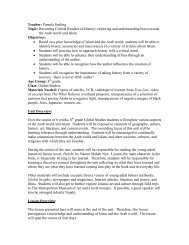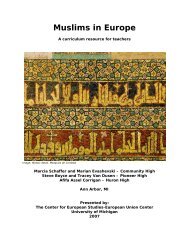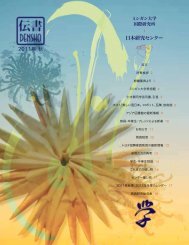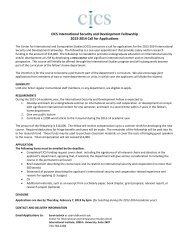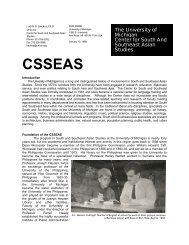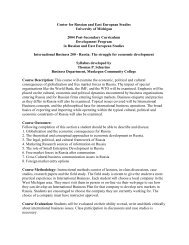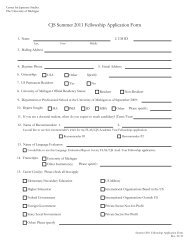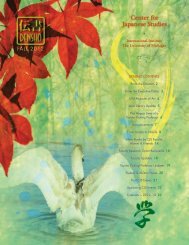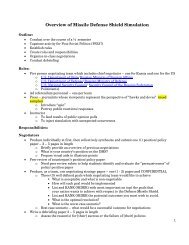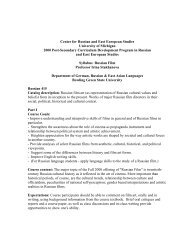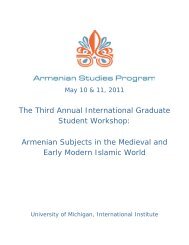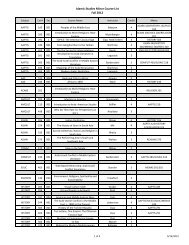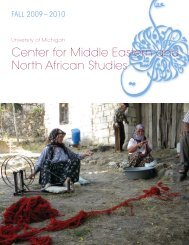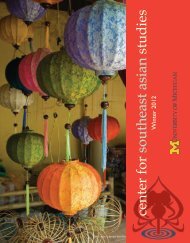Winter 2008 Newsletter - International Institute - University of Michigan
Winter 2008 Newsletter - International Institute - University of Michigan
Winter 2008 Newsletter - International Institute - University of Michigan
You also want an ePaper? Increase the reach of your titles
YUMPU automatically turns print PDFs into web optimized ePapers that Google loves.
, Robbins Burling, Bill Gedney and Paz Naylor<br />
5<br />
Robbins Burling graduated with a B.A.<br />
from Yale in 1950 and Ph.D. in Anthropology<br />
from Harvard in 1958. He taught at<br />
the <strong>University</strong> <strong>of</strong> Pennsylvania from 1957<br />
to 1963, taking a leave <strong>of</strong> absence from<br />
1959-60 when he was a Fulbright Visiting<br />
Lecturer at the <strong>University</strong> <strong>of</strong> Rangoon<br />
in Burma. Rob came to the <strong>University</strong> <strong>of</strong><br />
<strong>Michigan</strong> in 1963 as Associate Pr<strong>of</strong>essor <strong>of</strong><br />
Anthropology, and was Pr<strong>of</strong>essor <strong>of</strong> Anthropology<br />
(serving as Chair from 1980-83) and Linguistics from<br />
1966 to 1995, when he retired as Pr<strong>of</strong>essor Emeritus, though this<br />
has certainly not marked the end <strong>of</strong> his scholarship.<br />
As reflects his dual appointment in Linguistics and Anthropology,<br />
Rob’s work concerns the structures <strong>of</strong> both language and culture.<br />
This is well seen in his scholarship on the Garo <strong>of</strong> Northeastern<br />
India and Burma, and on Tibeto-Burman linguistics, with work<br />
on subjects ranging from family structures and the language <strong>of</strong><br />
kinship [“Garo Avuncular Authority and Matrilateral Cross-Cousin<br />
Marriage,” (1958); “Garo Kinship Terms and the Analysis <strong>of</strong> Meaning,”<br />
(1968)], to the structures <strong>of</strong> Garo language [“Garo Spelling<br />
and Garo Phonology” (1981) and “Noun-Compounding in Garo”<br />
(1985) and “Garo as a Minimal Tone Language” (1992).]<br />
His other Southeast Asia work includes the classic Hill Farms and<br />
Padi Fields, Life in Mainland Southeast Asia (1965, 2nd edition<br />
1992); and work on Burman, again looking both at family structures<br />
[“Burmese Kinship Terminology,” (1965)] and languages<br />
[Proto-Lolo Burmese (1967); “Proto-Karen: A Reanalysis” (1969) and<br />
“The Historical Place <strong>of</strong> Jingphaw in Tibeto-Burman” (1971).]<br />
Rob’s interests were always wide-ranging, including writings<br />
on religion and politics [“Cognition and Componential Analysis:<br />
God’s Truth or Hocus-Pocus” (1964); The Passage <strong>of</strong> Power: Studies<br />
in Political Succession (1974)]. His interest in the teaching <strong>of</strong> language<br />
resulted in many publications, such as “Talking to Teachers<br />
about Social Dialects,” (1971); “Machine-Aided Instruction<br />
in Bahasa Indonesia” (with A.L. Becker, Patricia Henry and Joyce<br />
Tomasowa, 1981) and Learning a Field Language (1984).<br />
Rob continues to be very active in research and publication. He<br />
is engaged in fieldwork in India as this newsletter goes to press,<br />
and his requests to have his membership on CSEAS email lists<br />
turned on and <strong>of</strong>f as he leaves for the field and then returns<br />
home are as regular as the changing <strong>of</strong> the seasons. His most<br />
recent work continues to explore questions that have animated<br />
his interest for decades as he has published “Where did the Garos<br />
come from?” (2003); “Prosody is not Language,” (2003); and “Language,<br />
Ethnicity and Migration in North-Eastern India” (2007).<br />
A 1993 article “Primate Calls, Human Language and Nonverbal<br />
Communication”, in Current Anthropology foreshadowed his<br />
recent critically acclaimed book from Oxford Press, The Talking<br />
Ape: How Language Evolved (2005). Described by Oxbow as<br />
“one <strong>of</strong> the most approachable books on the development <strong>of</strong><br />
human language available,” the book traces language back to<br />
its origins among apes just pre-dating the establishment <strong>of</strong> human<br />
societies, examining the links between signs, sounds and<br />
meanings and exploring the “prehistories” <strong>of</strong> vocabulary and<br />
grammar, thereby helping us understand better the very nature<br />
<strong>of</strong> language and how it affects our thoughts and actions and our<br />
relationships with each other.<br />
Paz Buenaventura<br />
Naylor<br />
graduated with<br />
a B.A. in English<br />
(cum laude) from<br />
the <strong>University</strong> <strong>of</strong><br />
the Philippines in<br />
1950, and completed<br />
an M.A. in<br />
Linguistics in 1955<br />
from the <strong>University</strong><br />
<strong>of</strong> <strong>Michigan</strong>,<br />
where she was a<br />
Barbour Scholar. She obtained her Ph.D.<br />
in Linguistics, from <strong>Michigan</strong> in 1973.<br />
Her dissertation on “Topic, Focus and<br />
Emphasis in the Tagalog Verb Clause” was<br />
published in Oceanic Linguistics (1975).<br />
Paz’s extensive scholarly contributions<br />
resulted in many invitations to present<br />
her work at international conferences.<br />
She was also a visiting scholar at several<br />
institutions, including the London School<br />
<strong>of</strong> Oriental and African Studies (1988-<br />
89). In 1977 she set up at <strong>Michigan</strong> the<br />
first, and for eleven years, only Tagalog<br />
language program on the U.S. mainland.<br />
She taught all levels <strong>of</strong> Tagalog in the<br />
Department <strong>of</strong> Asian Languages and<br />
Cultures from 1986 until her retirement<br />
from teaching in 1994, when she was<br />
Adjunct Associate Pr<strong>of</strong>essor. Paz has also<br />
been extremely active in <strong>University</strong> and<br />
community circles, serving on many committees<br />
over the years, and receiving the<br />
“Outstanding Filipino Woman <strong>of</strong> the Year<br />
Scholastic Advancement”, award from the<br />
Filipino American Association and the<br />
<strong>International</strong> Women’s Forum in 1985.<br />
In 1979, Paz edited Austronesian Studies:<br />
Papers From The Second Eastern Conference<br />
On Austronesian Languages for the Center<br />
for South and Southeast Asian Studies’<br />
<strong>Michigan</strong> Papers on South and Southeast<br />
Asia series, also contributing a paper to<br />
the volume on “Linking, Relation-Marking<br />
and Tagalog Syntax”. Her numerous other<br />
publications include “Expressions <strong>of</strong> Irrealis<br />
in Some Philippine Languages,” <strong>University</strong><br />
<strong>of</strong> <strong>Michigan</strong> Publications in Linguistics<br />
(1978); “Toward Focus in Austronesian”<br />
in Wurm and Carrington, eds., Second<br />
<strong>International</strong> Conference on Austronesian<br />
Linguistics: Proceedings (1979); “The Pragmatics<br />
<strong>of</strong> Focus” and “On the Semantics<br />
<strong>of</strong> Reduplication” in Geraghty, Carrington,<br />
and Wurm, eds., FOCAL I: Papers From The<br />
Fourth <strong>International</strong> Conference On Austronesian<br />
Linguistics (1986); “Focus, Discourse<br />
Pragmatics, and Language Typology” in<br />
Bahner, Werner, Schildt and Viehweger,<br />
eds., Proceedings <strong>of</strong> the <strong>International</strong><br />
Congress Of Linguists (1991); “Subject,<br />
Topic, and Tagalog Syntax” in Bennett,<br />
Bynon, and Hewitt, eds., Subject, Voice<br />
And Ergativity (1995); and “On the Stative<br />
Predicate: Tagalog Existentials Revisited”<br />
in Liao and Rubino,eds., Current Issues In<br />
Philippine Linguistics And Anthropology:<br />
Parangal Kay Lawrence A. Reid (2006). Her<br />
book on Tagalog in the London Oriental<br />
and African Language Series is forthcoming<br />
from the John Benjamins Publishing<br />
Co., Amsterdam.<br />
Paz lives in Ann Arbor with her husband<br />
Barney, and continues to be actively<br />
involved in the life <strong>of</strong> the Center for<br />
Southeast Asian Studies. She has been a<br />
strong supporter <strong>of</strong> the Philippine Studies<br />
Endowment, and can <strong>of</strong>ten be found at<br />
the CSEAS Friday-at-Noon lecture series,<br />
always with a comment and an incisive<br />
question for the speaker at the talk’s<br />
conclusion.



